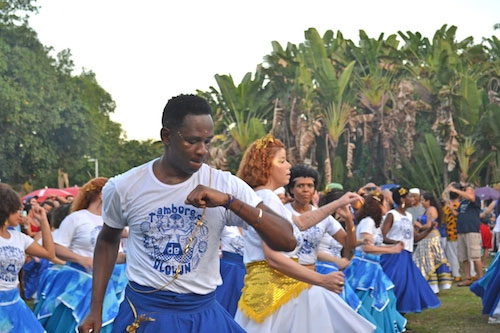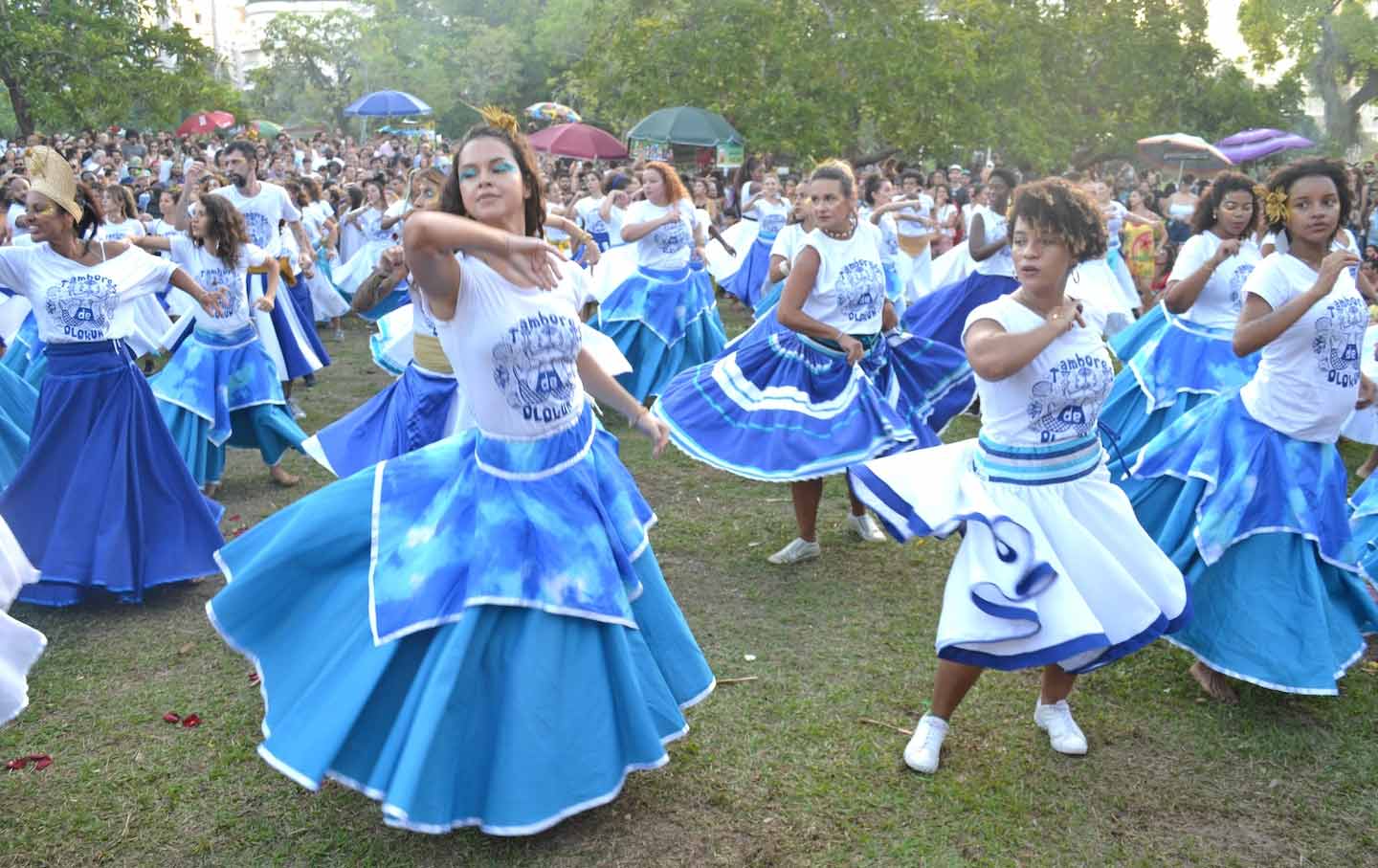“The streets belong to the people” of Rio de Janeiro
Every day during the Tiradentes vacation week in Brazil, Luísa Classen woke up at 8 a.m., put on a comfy bathing suit, put some glitter makeup on her face, and headed to a party. street in downtown Rio de Janeiro. Although Carnival usually takes place in February, from Thursday April 19 to Sunday April 22, Classen and thousands of revelers, musicians, dancers and street vendors attended their second Carnival of 2022.
This turn of events was somewhat surprising: Officially, street parties had been canceled for the year. In January, after a year without Carnival due to the pandemic, Rio de Janeiro’s mayor canceled the upcoming February street parties in light of high Covid-19 numbers following the end-of-year festivities. In Brazil, 667,000 people have died of Covid-19 so far during the pandemic, which has brought the country – and especially those financially dependent on Carnival and cultural production to survive – to a standstill since March. 2020.
To deter revelers from building crowds, Mayor Eduardo Paes provided no support for groups that would take to the streets to play music, drink, dance and throw the world’s biggest party. Meanwhile, the mayor has allowed private, corporate-sponsored club nights to take place across the city during Carnival week – at prices unaffordable for most people.
But the foliage (revelers) have not been deterred from partying in the streets – in fact, the cancellation of publicly accessible parties has sparked protests against the “elitisation of Carnival” by organized Carnival groups called blocks. Carnival lovers took to the streets in February in defiance of the government’s lack of support – and they did so again in April and May. The parties recalled the Carnivals of the 19th century, when street parties and carnal indulgences became key to the festivities, and when the bourgeois media campaigned against and stigmatized street parties attended and organized by the working class, while the Brazilian elites organized masked parties in theaters and clubs.
“Carnival is a party for everyone and it should always be free,” Classen said. “It’s a lot like a day at the beach: you see different people divided by their social class, but everyone is in the same space – there’s no prioritization of sunlight depending on the price you pay.”
During Carnival, the streets are filled with vibrant music, people in makeshift costumes dance to the beat of drums, and street vendors are ready with coolers full of beer and water. Each bloco, or party band, is different – they vary in music choice, size, theme and general vibe – but everyone is always welcome. Costumes vary from colorful and traditional to skimpy and practical, with perhaps the only rule being the application of sequins wherever you can place them.
The last time Carnival was canceled was in 1918, due to the Spanish flu pandemic. Just like in 2021, revelers did not gather in the streets to avoid superspreader events. There are no exact statistics on the Spanish Flu death rate in Brazil, but 12,700 deaths were recorded in Rio de Janeiro at the time; during the Covid-19 pandemic, there were 73,643 deaths in the city. In 1919, after surviving a pandemic and World War I, revelers and organizers made Carnival last for three months. The March 3, 1919 edition of the daily Correio da Manha reported: “Carnival is the great force that frees the people of Rio from the sadness of the rest of the year.”
“I think we had a period of grief because of the pandemic,” said Glauber Oliveira Alencar, a publicist who plays trombone and snare drum during Carnival, recalling the 664,000 people who died of Covid-19 in Brazil. . “And now we are having a fun time. We allow ourselves to do things that we couldn’t do before.
This year’s double Carnival has explicitly returned the event to its democratic and working-class roots – and the continuation of the festivities without the support of the authorities demonstrates that this is a party that belongs to the people. The Ocupa Carnaval movement pushed back against the mayor’s decision not to support street parties by releasing a manifesto signed by more than 140 groups across the city.
“The carnival is not a social event that depends on the authorization of the public authorities, it is an expression of the people and a historical right conquered by the struggle.” the manifesto published on April 13 reads. “The street belongs to the people and our voices are free…. There are many of us: street vendors, musicians, partygoers, dancers, seamstresses, artisans, etc. Carnival is work, celebration and collective struggle.
Although Carnival was introduced to Brazil by the Portuguese during colonization, the celebration was revived by African slaves who incorporated their rhythms and religious beliefs into their celebrations. Since then, Carnival has historically been frowned upon and repressed by authorities, including religious groups and elected officials – from 1905 to 1915, for example, street party groups and other cultural forms of Afro-Brazilian festivities have been banned. And when that failed to stop the street parties, corporate monetization of the party became the default. The corporatization of Carnival is, of course, beneficial for the city: today, Carnival generates a profit of 4 billion reais (about 800 million US dollars) in Rio each year, which corresponds to 1.4% of GDP city annual.
For Tomás Ramos, a musician who plays the saxophone in several blocks across Rio and a member of the Ocupa Carnaval collective, Carnival has always been a political act of the people. “It was always about occupying the street happily, turning a street corner or a square into a place of hope,” Ramos said. “It was always about bringing people from all classes, from all parts of the city, to have fun together, which is a political act.”

The current political climate is also ripe for an extended Carnival 2022. As Brazil’s Evangelical President Jair Bolsonaro makes statements about the existence of the Brazilian Armed Forces actively involved in the next presidential elections, reminding Brazilians of the 1964 dictatorship when the military took power, the people of Rio demonstrate that the people are capable of organizing themselves without the authorities. Carnival, as a holiday that celebrates carnal pleasure without shame, is generally frowned upon by religious groups that support the current president and lean more conservatively, adding a layer of political resistance to this year’s underground festivities. At several street parties, revelers chanted for the president to “go fuck themselves”, sang songs in support of the opposition and reveled in carnal pleasure in defiance of the evangelical president. Partygoers handed out stickers calling for Bolsonaro’s ouster and the election of his opponent and ex-president Lula da Silva, a demand expressed often and with abandon.
When the pandemic forced the cancellation of Carnival in 2021, thousands of musicians, performers, street vendors, artists and anyone involved with the annual event were financially impacted. The pandemic has deepened the inequalities that already existed in Brazil, leaving 15 million people unemployed, forcing workers into precarious informal work. The Brazilian Institute of Geography and Statistics estimates that in 2022 9 percent of the Brazilian population is in a situation of food insecurity. This year’s unofficial holiday has prompted workers selling food and drink to return to the streets. Maria dos Camelôs, peddler and organizer of the United movement of street vendors in Riosays Carnival is when street vendors profit enough to pay their debts and save money for the rest of the year.

“The return of Carnival was really important for street vendors,” Maria said. “For us, it was better because there were no official brands monopolizing the streets. There were no bathrooms, but we didn’t miss them that much. We organized ourselves, we went to the street and the party was beautiful.
And the party is not over. The city is currently hosting an event in June to boost tourism in Rio during Festa Junina, an annual month-long celebration of northeastern and rural Brazilian culture. The city hasn’t released much information beyond initial plans to merge Carnival and Festa Junina festivities, but said it would support larger party groups to take to the streets.
“We will go to all Carnival events no matter what,” Maria said.


Comments are closed.